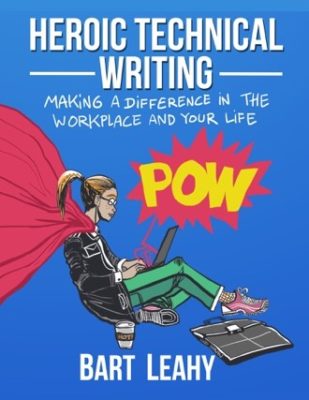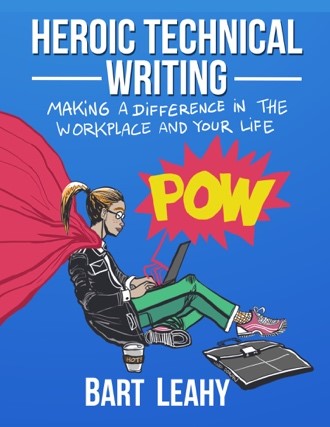 A lot of amazing people have helped the Science Cheerleaders along the way. Bart Leahy is definitely one of those people. Bart is a technical writer who served as the Science Cheerleader’s fearless Event & Membership Director for ten years and also occasionally contributes writing for ScienceCheerleaders.org. Now he’s got a new book out called Heroic Technical Writing: Making a Difference in the Workplace and Your Life. We wanted to catch up with honorary Science Cheerleader Bart, hear about what he’s accomplished since retiring from SciCheer, and hear all about his new book!
A lot of amazing people have helped the Science Cheerleaders along the way. Bart Leahy is definitely one of those people. Bart is a technical writer who served as the Science Cheerleader’s fearless Event & Membership Director for ten years and also occasionally contributes writing for ScienceCheerleaders.org. Now he’s got a new book out called Heroic Technical Writing: Making a Difference in the Workplace and Your Life. We wanted to catch up with honorary Science Cheerleader Bart, hear about what he’s accomplished since retiring from SciCheer, and hear all about his new book!
Let’s start with the basics: what is technical writing and why did you write a book about it?
Technical writers are individuals who are paid to organize highly technical information so it can be used by other, potentially non-technical audiences to take an action of some kind. This can include things, such as business or grant proposals, technical reports, planning documents, user instructions, help menus, or educational materials. Some of those items might not sound exciting, but I love my job because it’s like teaching in written form. I wrote the book as advice for people who don’t know what they want to do with their lives but love writing and scientific or technical subjects. I would’ve loved to have this kind of book when I was fresh out of college!
How did you get into this career field?
I went to a space exploration conference in my late 20s. This is a gathering of scientists, engineers, and others interested in getting humans to live and work in places beyond Earth in reality (not fiction). I already had an English degree, but after I attended the conference, I wanted to contribute to the space industry somehow, and I needed to prove that I could be useful to engineers. I went back to school for engineering , but after a couple years, I was struggling. I liked engineering, but wasn’t particularly good at it. I tried the graduate tech writing program at University of Central Florida, which I could finish in three years, and there was no math. Since the degree, I’ve done technical writing in multiple environments: Disney, Department of Defense, NASA, Nissan, and several private-sector space companies.
What’s the book about?
Heroic Technical Writing is a handbook for anyone who has technical writing to do or has a job in the field. A lot of scientists and engineers need to write about their work and they might not have a tech writer working in their organization. The book helps with all aspects of the writing process, from researching to interviewing subject matter experts to organizing, writing, and editing your material. So there’s a lot of practical advice on tech writing tasks. However, much of the book discusses stuff they don’t teach you in tech writing class, such as how to job hunt, network, deal with stress, and talk with people…and sometimes how not to. Learn more or purchase the book here.
What do you like most about your job?
I’m a space geek, so obviously the subject matter motivates me. Before I got into this line of work, I read a lot of science fiction. My space-related customers launch rockets or build hardware dedicated to putting people into space. I’m not going to be an astronaut, but I can still contribute in my own way. The whole business is incredibly interesting to me.
Do you need an advanced degree to be a technical writer?
Actually, no. That was the path I took because until that point in my life, my education was in literature and my work experience was in retail and tourism. I needed to do something to prove I could do the job. If I’d gotten a bachelor’s degree in tech writing in the first place, I might’ve been just fine. Many of my peers earned degrees in things other than tech writing and sort of fell into the job—people with backgrounds in communication, science, engineering, or journalism.
What makes technical writing different from other kinds of writing?
Besides explaining how a specific science or technology works, one of the most important things a tech writer does is organize information. This isn’t just a matter of getting the words right, but also arranging the subject matter in an order that makes sense and in a format that’s easy to use. I call what I do “translating Engineerish into English” because I’m usually making technical content more useful for people who are not engineers.
Why is it “Heroic” Technical Writing?
As I said, I love my job. I believe I make useful contributions to the workplaces I support, whether it’s writing a proposal that wins a contract, editing an engineering document so others can understand its instructions, or speaking up if I see an action that I think could harm others. That’s on the job. In my life and career, I like to believe that I have at least some control over my future, and I can take actions that improve my professional standing or personal happiness. That’s the sort of attitude successful heroes in stories have. But no, I don’t wear a cape on the job.
Tell us about the cover of your book.
The cover was designed by an artist named Mars Dorian. I went online looking for someone who could design cover art with a comic book feel—again, it’s that whole “hero” thing. The person on the cover is a woman, partly because women make up 55 percent of the tech writing field and 55% of my blog readers as well. I had Mars design a similar cover with a cartoon version of me in the same pose, but it just didn’t look as good. The cape was mandatory. I wanted a 1960s “Batman” feel to things, so I’m very happy with it.
How did you get involved with the Science Cheerleaders?
A mutual friend introduced me to Darlene Cavalier in 2008 and we found that we had common interests in science, education, and citizen involvement in science decision making. (Dar’s short version is, “I picked you, dude!”) Anyhow, I started out just writing for the SciCheer page, but then Dar asked if I wanted to help do some of the logistical work when the Science Cheerleaders became an actual group of performers. I applied a lot of my tech writing experience, as I created schedules, itineraries, articles, messages, and scripts for a lot of super-brainy women. Definitely one of my more interesting side jobs.
What’s the most important advice you offer in the book?
Regarding tech writing: always find out what your audience, situation, and intended outcomes are—those will help you better shape what you write and how you organize it.
Regarding the career: you can do this—even if you weren’t trained as a scientist or engineer!
Thanks, Bart. We wish you luck with your book!
You’re quite welcome.

